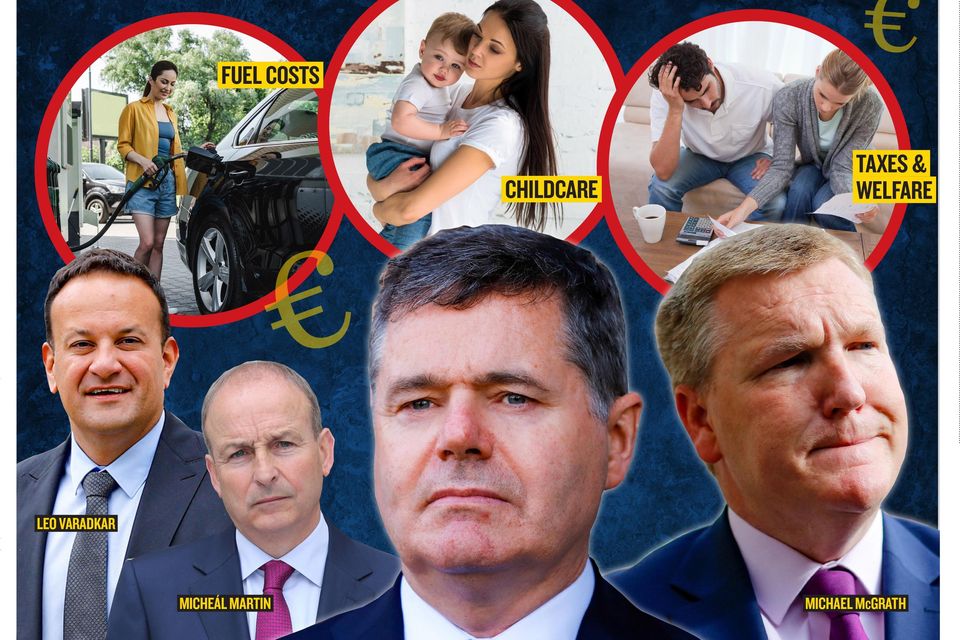Two years on, Coalition at odds as it faces the perfect storm
After receiving widespread government supports during the pandemic, the public will expect state help to deal with the crisis in the cost of living
Coalition Government is facing the perfect storm
The latest victim of the cost of living crisis is the traditional two-day ard fheis — at least for Sinn Féin. It has decided to host a one-day conference instead in the RDS in early November.
The reason, according to one senior Sinn Féin figure, is the party believes it cannot justify forcing members to stay overnight in Dublin when hotel room prices are skyrocketing.
Cynics and opponents may scoff that such moves are mere optics, but there is little doubt Sinn Féin’s focus on the cost of living issue has been relentless in recent months across the Dáil, in the media, and on all its highly popular social channels.
This coming week it is to table a Dáil motion demanding the Government immediately introduce an emergency budget and extend “further supports to workers and families to support them with the many high and rising cost (sic) they are facing now”.
The political dividend from hammering those in government at a time of rising prices that has left homeowners of any and all means struggling to make ends meet is obvious.
Throw in a series of stories that have emerged over the last week alone of pay rises for public servants earning more than €150,000, collapsed public sector pay talks, record fines for banks over the tracker mortgage scandal, a lack of school places for children with special education needs and an ESRI warning of further inflation ahead, and it all amounts to a perfect storm for the Coalition.
The view within Government Buildings has hardened that nothing can or should be done until a comprehensive response can be announced in the budget this October.
While Taoiseach Micheál Martin has repeatedly sought in recent days to put to bed any suggestion of government action before October, Leo Varadkar has left the door slightly ajar to an intervention before then if there is a “further dramatic escalation” in fuel prices.
“What if fuel went to €2.50 or €3, would that be sustainable?” one government source speculated. “But the options available are limited if that did happen.”
Indeed, the Tánaiste’s party colleague, Finance Minister Paschal Donohoe, has been insisting to anyone who will listen he has reached the limit on what can be done on the cost of petrol and diesel. Reducing VAT further would require an across-the-board cut for all goods and services in the economy.
That does not preclude a targeted, welfare-based intervention such as a further fuel allowance payment for the most vulnerable. There have been two already in the last three months.
But nothing is being planned at this stage. The minister whose department would dole out such payments, Heather Humphreys, is said to have grown weary of the amount of kites being flown with the budget some four months away.
Last week Varadkar talked up record jobs numbers and buoyant tax receipts, which he said would give the Coalition “more room to manoeuvre for the budget this autumn than we would have had in any year in recent years”.
A meaningful reduction in the cost of childcare, tax cuts and welfare increases that won’t all be gobbled up by inflation are now being strongly mooted.
Varadkar has also previously trailed the possible introduction of an eye-catching middle-income tax rate of 30pc, which Donohoe’s department has been asked to look at.
Read more
But in a speech at the National Economic Dialogue on Monday, Varadkar made no reference to this 30pc rate, and instead spoke of index-linking tax credits and tax bands. “I think the case for this is stronger than ever,” he said.
On the Fianna Fáil side of Government they are growing weary of what one source said is Varadkar “trying to do his usual delivery of good news before everybody else”.
This is a view not confined to Fianna Fáil. There are some in Government who just don’t like the way Varadkar goes about his business, particularly when it comes to trailing things the Government could do or might look at doing. But one Fine Gael source countered: “If you’re the minister for jobs and you’ve record employment, you’re not going to hide your light under the bushel.”
However, there has been no discussion of new measures before the summer break and Varadkar did not push the case for them at the meeting between the three Coalition leaders and the two finance ministers last Monday. “There has been no serious debate about what the content of a summer package could be,” said one government source. “You could do a package now but there would be less for one-off measures in the autumn.”
The parameters of the now hotly awaited October budget package will be laid out in the Summer Economic Statement, which is likely to be published in the final week before the Dáil recess in mid-July. Donohoe and Public Expenditure Minister Michael McGrath are then likely to spend the following weeks and months managing expectations and urging caution at a time of great uncertainty.
As well as the aforementioned changes to tax, welfare and childcare costs, well-placed insiders say there will be a series of one-off measures. “It is a fuel crisis. That’s where the main problem is,” one source said.
In that vein, the Government will likely consider changes to the weekly fuel allowance of €33, which is currently paid out to 372,000 households on a means-tested basis for 28 weeks of the year.
In March, the Government paid out an additional one-off payment of €125 and did another payment round of €100 to eligible households last month. Changing the criteria for the fuel allowance to make more households eligible will be examined in the coming months.
Before then the Government hopes to have a new public sector pay deal in place for the State’s 340,000 public and civil servants.
Negotiations collapsed at the Workplace Relations Commission (WRC) in the early hours of the Friday before last after proposed pay increases of 5pc in 2022 and 2023, on top of two 1pc rises being paid this year, was rejected.
The Irish Congress of Trade Unions’ public services committee said the amount tabled fell “well short of inflation”. The Government argued what was on offer amounted to a cumulative pay increase of 7pc over two years.
“Negotiations were very, very slow to get under way, civil when they took place, but inconclusive,” one source on the trade union side said.
The Coalition is reasonably relaxed about the matter. No one disagrees that a pay increase is necessary and the hope inside Government Buildings is that as the economic challenges grow and the global outlook deteriorates the offer on the table will grow more appealing to unions, who are unlikely to agree with that view.
The WRC is talking to both parties but no date has been set for talks.
More contentious is the restoration of financial crisis-era pay cuts to around 4,000 public servants earning more than €150,000 a year which will go ahead on July 1, despite McGrath’s efforts to defer the move. The advice from the Attorney General to both him and the Government is said to have been categoric that no changes could be made to the existing legislation that paves the way for the final restoration of the Financial Emergency Measures in Public Interests (Fempi) cuts.
Most of those benefiting are doctors, but also judges, some State body chief executives and top civil servants, who all stand to benefit by thousands of euro a year.
However, the restoration has no impact on the €300,000-a-year salary of Department of Health secretary general Robert Watt, nor another senior official there, the outgoing chief medical officer Tony Holohan.
The Sunday Independent has established the final unwinding of Fempi on July 1 does not see his pay or pension arrangements affected at all. Holohan is to resign from the department on the same day, which had led some TDs to privately speculate his date of the departure was linked to the pay restoration and the effect of this on his lump sum and pension. Not so, it transpires.
Tomorrow marks exactly two years since the Coalition took office, with the economic landscape having changed utterly since then. The emergency spending taps that were turned on when Covid was rampant and Holohan was in his pomp are now switched off again.
Now the State is confronting a new crisis in the form of the war in Ukraine. Its repercussions for the economy and society are vastly uncertain yet the public’s expectation that the Government can step in to help — as it did during the pandemic — has not changed.
“The budget will have to be something that people can feel,” one insider said. “It has to be something that people will say was a worthwhile effort.”
Not long after it is announced in mid-October — or perhaps before then — the attention of many in political circles will have turned toward December 15, when Micheál Martin is due to swap offices with Leo Varadkar and when a Cabinet reshuffle is expected.
When they return from the Dáil summer recess in September, some ministers may encounter less enthusiasm for their policy priorities from civil servants who know all too well their political masters could change within weeks.
If those at the Cabinet table are finding it tough now, the autumn and winter are set to be even more of a challenge.
Join the Irish Independent WhatsApp channel
Stay up to date with all the latest news














